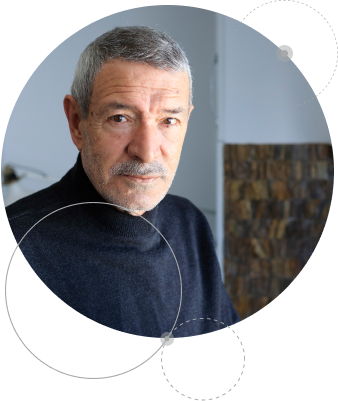MagnetisMM-32: enrolling for people with relapsed/ refractory multiple myeloma

Have you previously received treatment for your multiple myeloma? A clinical study may be an option for you.
The MagnetisMM-32 (MM32) clinical trial is exploring whether the study medicine (elranatamab) is safe and effective in treating people with multiple myeloma that has come back after prior treatment. MM32 is looking at the benefits of treatment with the study medicine alone versus treatment with several other medicines given together.
Who may participate?
You may qualify* for the study if you:
- Have received 1 to 4 rounds of treatment for multiple myeloma, including anti-CD38 antibody therapy and a lenalidomide-containing regimen**
- Have multiple myeloma that has worsened or has not responded to your last round of treatment
- Are at least 18 years of age (or minimum age of consent)
You may not qualify* for the study if you:
- Have certain medical conditions, including cardiovascular diseases, neuropathies and other active infections
- Have had other cancers in the past 3 years
- Have had certain types of prior treatments for multiple myeloma
- Are pregnant, breastfeeding or able to get your partner pregnant
* There are other requirements for taking part in this trial.
** If you are not sure which treatments you have received, please ask your doctor.

The disease, disorder, syndrome, illness or injury that is being studied.
The age a person must be to participate in a clinical trial.
The sex of people who may participate in a clinical trial. Sex is a person’s classification based on assignment at birth. Eligibility based on sex is distinct from eligibility based on gender.
What to expect
MM32 is a Phase 3, randomised, open-label study.
- ‘Phase 3’ clinical trials look at the safety and effectiveness of the study medicine. Phase 3 is the last phase of testing to be completed before the study drug is submitted for regulatory review and potential approval.
- 'Randomised' means participants will be assigned to a treatment by chance (like tossing a coin). Neither you nor the study doctor can choose which treatment you will receive.
- ‘Open-label’ means that both you and the study doctor will know which treatment you are receiving.

If you are eligible and decide to take part in the study, you will be randomly assigned to receive:
- The study medicine, elranatamab, as an injection under the skin.
OR one of the following combination treatments.Your study doctor will decide which one of the three combination treatments is best for you (EPd, PVd, or Kd):
- EPd: this combination includes three medications (elotuzumab, pomalidomide and dexamethasone) that are given in 28-day cycles: elotuzumab is given by needle into your vein at the study clinic, and dexamethasone and pomalidomide are taken by mouth at home.
- PVd: this combination includes three medications (pomalidomide, bortezomib and dexamethasone) that are given in 21-day cycles: bortezomib is given as an injection under the skin or needle into your vein at the study clinic, and dexamethasone and pomalidomide are taken by mouth at home.
- Kd: this combination includes two medications (carfilzomib and dexamethasone) that are given in 28-day cycles: carfilzomib is given by needle into your vein at the study clinic and dexamethasone is taken by mouth at home.

You will have a 50% (1 in 2) chance of receiving the study medicine, elranatamab, or one of the combination treatments above (EPd, PVd, or Kd).
Length of study treatment is the length of time the study participants will receive the study treatment.
The frequency of study visits depends on which treatment you receive. You will visit the study doctor 1 to 6 times every month until you stop receiving the study treatment.
Varies depending on study group.
Some studies require the study team to stay in contact with the participant for a period of time after the participant completes the main part of the study. This long-term follow up is to collect additional information on the study drug over time.
Potential benefits and risks of taking part in the MM32 study
By participating in this study, you will receive treatment and close monitoring of your multiple myeloma. You will also help answer whether treatment with the study medicine, elranatamab, is safe and more effective at keeping multiple myeloma from getting worse than combination treatments commonly provided to patients whose multiple myeloma has worsened or come back after prior treatment.


About the study medicine
We are evaluating the study medicine elranatamab, to see if it is safe and effective for the treatment of multiple myeloma in people who have previously received 1-4 rounds of treatment for multiple myeloma.
The study medicine, elranatamab, is given as a subcutaneous (SC) injection under the skin. It is thought to work by connecting certain immune system cells, known as T-cells, to myeloma cells. Connecting these cells activates the immune cells to kill the myeloma cells.
Frequently asked questions
Multiple myeloma is a type of blood cancer that forms in bone marrow. Healthy bone marrow produces plasma cells, which make antibodies to fight infection. But, in multiple myeloma, plasma cells become cancerous. These cancer cells can crowd out normal blood cells, forming tumours and leaving a person vulnerable to infection.
The study medicine elranatamab, is thought to work by connecting certain immune system cells, known as T-cells, to myeloma cells (cancer cells). Connecting these cells activates the immune cells, potentially killing the myeloma cells.
- Immunomodulatory drugs (IMiDs) help adjust the immune response to kill cancer cells or make it difficult for them to grow.
- Anti-CD38 antibodies kill cancer cells and may alter the immune response.
- Proteasome inhibitors (PIs) kill cancer cells by blocking the destruction of pathways in the cells that remove excess proteins. In doing this, the cells die.
- B-cell maturation antigen (BCMA) antibodies target a protein found on the surface of myeloma cells.
Relapse is when a treatment works for a while and then stops working, which leads to the disease coming back. Refractory is when a disease doesn’t respond to treatment. Relapsed/refractory multiple myeloma refers to multiple myeloma that either comes back after responding to treatment or doesn’t respond to treatment at all.
The study treatment(s) and all study-related care and procedures are provided at no cost. You don’t need health insurance to join a clinical study. However, you (or the NHS or your health insurance provider) may be responsible for medical expenses that are part of your usual healthcare. Talk with your study team or review the informed consent document to find out exactly what is covered.
Travel to the study centre and other expenses (such as meals) may be covered. Please discuss the details with your study team.
Find answers to other FAQs
Find a clinical site near you
The MM32 study is taking place at research sites in multiple countries worldwide.
To find your nearest study site please enter your postal code and select the optimal distance to view on the map from the drop-down menu:
